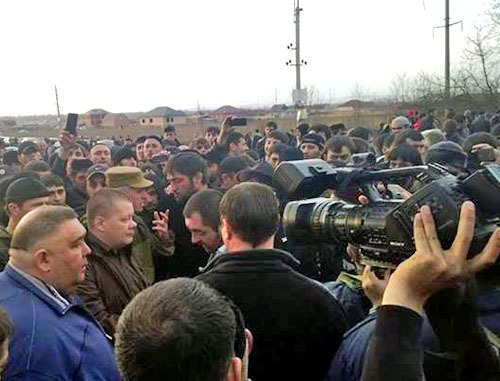
Signs of Inter-Ethnic Conflict Reappear in Disputed Border Area of North Ossetia
Publication: Eurasia Daily Monitor Volume: 11 Issue: 73
By:

Tensions have recently spiked not in the Republic of Ingushetia itself, but in the border area of neighboring North Ossetia, which is populated by ethnic Ingush. Residents of the village of Maiskoe rose up in protest after the law enforcement agencies of North Ossetia–Alania arrested two Ingush. The Ingush contest the ownership of North Ossetia’s Prigorodny district. Prior to their deportation in 1944, the Ingush lived there but cannot return now even though they were rehabilitated in 1957. So, any incidents in this part of North Ossetia are intensely watched in Ingushetia and immediately assume the overtones of an inter-ethnic conflict, even if there were no clashes with Ossetians, but rather with the republican authorities.
On April 9, the police arrested two young Ingush men in the village of Maiskoe in North Ossetia’s Prigorodny district, and relatives of the detainees blocked the federal highway that evening (https://region15.ru/news/2014/04/11/01-29/). According to a relative of one of the detainees, a police officer came to the two young men and asked them to go to the Oktyabrsky police station in North Ossetia for questioning. The young men did not return home after the interrogation and their whereabouts were unknown. The police practice of not revealing the location of detainees for security reasons unnerves their relatives because hundreds of people in the North Caucasus have disappeared after such arrests (https://m.golos-ameriki.ru/a/amnesty-international-russia/1216338.html). The source also said that the police searched the homes of the two detainees (https://north-osetia.kavkaz-uzel.ru/articles/240779/).
Having received no answer from the authorities by April 10, 400 relatives of the detainees blocked the federal highway again on April 11, and this time it attracted national attention (https://ingushetia.kavkaz-uzel.ru/articles/240820/). In response, the North Ossetian authorities forcibly dispersed the protesters, detaining as many as 50 of them (https://lifenews.ru/news/131076). The fact that two ministers from two different republics traveled to the site of the incident was indication of how significant it had become (https://www.interfax.ru/russia/371177).
Ingush President Yunus-Bek Yevkurov also became involved in the crisis, but he simply put the blame on the relatives of the detainees. According to Yevkurov, the relatives should have followed legal procedure and simply found a lawyer for the detainees. Yevkurov apparently did not understand that the protesters could not find a lawyer for their arrested relatives since the authorities had refused to acknowledge they had been arrested. Moreover, the Ingush president opined that provocateurs had been among the protesters who blocked the highway (https://kavpolit.com/articles/evkurov_sredi_mitingovavshih_na_federalnoj_trasse-3060/?utm_source=rss&utm_medium=rss&utm_campaign=basic).
In fact, it was only by protesting publicly that the relatives of the two detainees were able to find out where they were being held and lawyers were able to gain access to the detainees. Neither the North Ossetian nor the Ingush authorities need a scandal involving the blocking of a federal highway. The incident illuminates numerous problems, including inter-ethnic conflict in this area, the conflict involving the rebel underground movement, and the conflict between law enforcement agencies that do not always coordinate with each other. The incident also showed the weakness of the Kremlin’s appointees, who had to ask Moscow’s permission to allow the protesters to find the arrested individuals.
Having detained two young people who were not even charged with any crime, the authorities pitted hundreds and, perhaps, thousands of residents of this village and nearby towns against the government. North Ossetian law enforcement officers arrested a co-chair of the Mekhk-Khel (Country Council) opposition movement, Sarazhdin Sultygov, who is an invalid and nearly blind (https://06-ingushetiya.livejournal.com/248043.html). Sultygov’s detention may also result in protests by his relatives and by supporters of the opposition in Ingushetia. These secondary protests will put pressure on the leadership of Ingushetia, rather than on North Ossetia (https://www.ingushetiyaru.org/news/36808/).
Unexpectedly, details emerged of a possible attempt on the life of Magomed Mutsolgov, the leader of the organization Mashr (Accordance) and one of the most prominent human rights activists in Ingushetia. Word of the alleged assassination attempt on Magomed Mutsolgov was posted by the independent news blog of the Republic of Ingushetia on LiveJournal on April 9. The blogger alleged that federal special forces had received such an order. Mutsolgov himself said that he did not think the rumor was true, but added that he had no doubt he could be targeted (https://www.kavkaz-uzel.ru/articles/240801/).
News of the rumored assassination attempt came at a time when the Ingush authorities are doing everything possible to isolate the republican population from critics of the authorities. To crack down on sources for its critics, Ingushetia’s government ruled that a republican website, Habar.org, was an extremist news resource. Over the past year, this website has become the primary virtual platform for the republican opposition. The website evoked the ire of the authorities for its scathing criticism of Ingushetia’s government, and prosecutors accused it of extremism for a series of articles stating that the election of Yunus-Bek Yevkurov as Ingushetia’s president was illegitimate. The Sova information-analytical center, which specializes in issues related to nationalism, xenophobia and human rights in Russia, stated that this charge was unfounded (https://www.sova-center.ru/misuse/news/persecution/2014/04/d29265/).
Ingushetia’s authorities are angry about the opposition website not because it published a couple of negative articles about Yunus-Bek Yevkurov, but because of their general unhappiness with any alternative source of information in the republic. Earlier, the authorities almost blocked another website, Ingushetiyaru.org, which used to be popular and well-maintained. The crackdown on the sources of alternative information allowed dozens of official websites to hail the “achievements” of the republic under Yunus-Bek Yevkurov’s unwavering guidance.
Consequently, Ingush authorities have attempted not so much to resolve issues related to the problem of arrests and disappearances of people in the republic as to prohibit the dissemination of such information. This will lead to an escalation of the conflict, not its resolution.




